This quote represents one of my main life philosophies. And for Winter Break, my good friend Travis and I read — or at least scanned — more than a few of the world’s pages: Paris, Brussels, Bruges, Amsterdam, Berlin, Prague, Munich, Zurich, Barcelona, Valencia.
In the spirit of shared experience, here are the “Top 10 Things I Learned,” as well as some funny quotes and anecdotes from an unforgettable 17 days spent living out of a suitcase.
No. 10: Döner Kebab is the fast food of Europe.
Seriously, you can find more gyros on the streets of every European capital than you can find Starbucks in Seattle. The Europeans cram the stuff down their throats like stoners walking up to a McDonald’s Drive-Thru. And you can´t blame them — kebab is one of the few affordable, quick foods available wherever you go at whatever hour you’re hungry, and it has a consistent quality no matter where you get it. Order the Combo No. 5 — you won´t regret it … until the next morning.
“You came all the way to France, and you’re eating a kebab?” — Saskia
No. 9: If you hear the word “outdoor” attached to “winter market” or “ice rink,” go.
Like kebabs, these things were everywhere, they were real, and they were spectacular. Often, they went hand-in-hand … or skate-in-skate, if you will. An ice rink and winter market in front of the Eiffel Tower were only surpassed by an ice rink in the Tower itself. But the best of these markets, by far, was in Bruges, Belgium. The food, the drinks, and the people all paled in comparison to our epic skating adventure, from which I still have a cut on my ankle that hasn’t fully healed. And it was so worth it.
“So you’re a pair of guys traveling through Europe together who like art,” Lisa said to us. “Are you gay?”
No. 8: Ted Mosby, Architect.
You don’t find too many skyscrapers in Europe. Instead, what you find are bridges, clock towers, and town halls three-to-five times older (or more) than The Declaration of Independence. The architecture stuns you, especially because it’s so different from the steel and glass of the American city skyline.
And churches — my, do they have churches. Practically every city in Europe has its own massive cathedral, Notre Dame being the most famous from our trip. As beautiful as these buildings are, one of the things that always strikes me is how much time, effort and, in particular, money went into their construction and upkeep. While Louis XVI and Marie Antoinette honored themselves in their ornate chapel at Versailles, for instance, their people starved.
But hey, at least God’s got a lot of nice houses.
“There’s like a piece of bread on a table and they’re like, “Oh my God, modern art!” — Sierra
No. 7: When you travel and plans go awry, laugh it off.
On our trip, we dealt with freezing hostel showers, being locked out of our room while wearing bath towels, and realizing at the end of a group dinner in Prague that they didn’t accept the credit cards or euros that half of us had to pay with. Travis lost his international EuRail train pass and I lost my keys, but we never lost our sanity. As Forest Gump once would’ve said if he spoke Spanish: “Mierda pasa.” Stuff happens, especially to travelers. Many times, all you can do is laugh.
“Hey, it´s Grandpa Sam!” — entire cast of Young and Happy Paris Hostel, after seeing me in my sweater vest.
No. 6: Bi-lingual, shmi-lingual!
In America and Spain alike, most people only speak their native language and maybe know a few words in some other tongue. In the places we visited, however, people have obviously been using their Rosetta Stone DVDs. In Belgium, for example, people spoke French, Dutch, Flemish and English. It’s more necessary in Europe to know multiple languages because so many different dialects exist in such cramped quarters, and it’s amazing to watch people communicate across borders.
Also, when you travel to a foreign land, always try to speak their language — even if you only know the phrases listed on your German hostel brochure (and I quote): “My friend is drunk,” “You’re cute,” and “I would like to have a pork knuckle.” You’ll fail miserably with the pronunciations, but people will appreciate the effort. A simple “How do you say …” will win you a smile and the understanding that you’re not just another ignorant American. (You may be one, but at least this practice will make it a little less obvious.)
“I knew you were a real American because you have straight, white teeth!” — Girl from Prague.
No. 5: We do speak Americano.
Tied in with No. 6, English, amazingly, turned out to be the unifying linguistic force of Europe. Once we left Spain, we didn’t visit a single place where we struggled to communicate with the locals because almost everyone knew at least some English. Don’t think, though, that only Brits and Yanks benefit from this; when Lithuanians and Belgians need to discuss something with Germans and Russians, they do so in English. It’s the perfect sense of why language exists: to enable the communication of one person’s thoughts to others. Now, if only we could improve the thoughts …
“You from the States?” I asked a bouncer outside a pub in Paris. He was as large as two normal human beings, had semi-dark black skin and short hair, and wore a Washington Redskins’ Clinton Portis jersey one night and a New England Patriots’ Tom Brady one the next.
“Nah, man, I’m from here,” he answered me in pitch-perfect English.
“You don’t really have an accent,” I told him. “Did you ever study English in school or something?”
“No, never,” he said.
“Then how did you learn?” I asked.
He shrugged. “TV, man.”
No. 4: “They’ve all gone to look for America.”
Europeans love the ‘American Dream.’ Although this can be a good thing — spreading English, technology and liberating ideas — it seems that, for the most part, Europeans are not absorbing what one might term the “richest” aspects of American culture. Everywhere you go, you hear Eminem and Rihanna and see KFC and McDonald’s. A TV spot on an American channel advertises a device called “OhMiBod” — an mp3-playing vibrator. Every newsstand in every train station offers you the latest scoop on Brad and Angelina in 10 different languages.
At any rate, I suppose it’s not that different than back home in the States, where more people — myself, sadly, included — can name the cast of The Jersey Shore than the presidential cabinet. Oh, Snooki.
During our train ride to Amsterdam, we sat across from four Dutch girls, all of whom wore Converse sneakers.
“I’m from New Jersey,” I told one of them, named Kaelie.
“Ooh,” she said, making a sour face.
“What — is there something wrong with New Jersey?”
“No,” she said, “nothing. I just want to go to Seattle.”
“Why would you want to go to Seattle?” I asked her.
Instantaneously, her face lit up. “Grey’s Anatomy!” she squealed.
I should’ve known.
No. 3: Adventure capitalism.
An Eastern European who had lived in a socialist country before moving to the U.S. once described capitalism to me as a “cozy jail.” This trip helped me understand what she meant: Capitalism offers many of us a comfortable lifestyle and the ability to buy things from which we can derive happiness, even if it´s short-lived. That´s the cozy part.
The jail part, I´ve come to understand, is this: The city centers — our glowing bastions of freedom — in Paris, in London, in Prague, in Berlin, in Zurich, in New York and Los Angeles and Chicago and Philadelphia all look relatively the same: a Starbucks, a guy selling food from a truck, a cheap Chinese restaurant, a picture of a scantily-clad woman selling perfume, and a homeless person on every corner. I´ve heard people say that ¨money is freedom to do what you want,¨ and in our current world that´s true. If money gets you freedom, then the system that perpetuates your need for money, for that freedom, subsequently does function like a sort of prison. Only those with an exceptional amount of money get free, while most of us settle for parole or never make it outside at all.
Still, as much of a jail as the capitalist system may be, it is a cozy jail — a much cozier jail than any form of socialism has produced thus far. One of the most fascinating things about my tour of Prague was hearing the guide speak about how terrible it had been under Communist rule, how the government had controlled all aspects of citizen life to the point that the people couldn’t take it anymore, and how much happier they are now. In Berlin, too, we saw the difference that western modernization brought about. So it is clear that capitalism provides important rights to its citizens, even if it catch-22´s them in a “survival of the fittest” economic system. It has improved, in many ways, millions of lives.
But when I look around, my eyes still perceive so much that needs fixing. As our global economy becomes more entangled and national debts pile up, as economies crash and a smaller world faces larger problems, it seems like a pertinent time to ask ourselves: Is there a better way?
“Hey, boys, you come with me and I take you to my strip club. You will love it there. We have one-legged midget girl!” — Middle-aged, Czech club promoter in Prague.
No. 2: Sometimes, you just have to sit on the couch.
Whenever Travis and I left our second Prague hostel to eat lunch and go sightseeing, we always returned to find the same 5-10 people on the living room couches where we’d left them. We both looked somewhat condescendingly on this — until our last night there. We were packing for Munich and weren’t tired, even though it was 2:00 or 3:00 in the morning.
Still, I was about to go to bed for sleep’s sake and sauntered into the lobby to say goodbye to a couple friends there; our train would leave in the morning before anyone woke up.
“Sit down for a minute,” our Norwegian friend Joakim said. He was sitting with our other roommate, Travis No. 2.
“Nah man, I gotta’ go to bed.”
“Just for a minute!” he persuaded me.
I sat down. “Ooooh — this is rather comfy.”
Four or five hours later, I left the living room to pack my bag and head for the train.
In between, Travis No. 1 and I enjoyed one of the best evenings of our trip. We sat and played chess, talked about life, and listened to stories with a group that included Joakim, Travis No. 2, some rowdy Italians, another American or two, and our Czech hostel staffer — citizens of the world, all.
“Travis,” I said at some point, “sometimes you just have to sit on the couch.”
He looked at me and nodded. We both understood that the moments shared with those people that evening were special and well worth sacrificing a few hours’ sleep.
Moral of the story: If people congregate to a place to relax and enjoy each others’ company, there’s probably a darn good reason. So take a seat, watch, and listen, because you might enjoy yourself.
“Travis, I’ve a feeling we’re not in Kansas anymore,” I said.
“No,” he agreed. “This is definitely Central Europe.”
No. 1: The more things change, the more they stay the same.
This lesson learned from all my travels is something a lot of people might miss: Wherever you go, people are people.
During travel, you encounter tons of differences — the languages, the food, the music, the customs, the clothes, the currencies. But the things that divide us matter so little compared to the things that unite us. People are people! In general, we care about the same stuff, we worry about the same stuff, and we’re made of the same stuff. My friend Kris has a tattoo that reads, “We All Bleed Red — Sangramos El Mismo Color.” We all eat, we all drink, we all sleep, we all breathe, we all go potty, we all make babies, and we all tell corny jokes about going potty and making babies. We all love feeding the ducks. We smile, we laugh, we cry. We love. We live, and we die. Every single one of us.
That’s the sometimes tragic, sometimes euphoric, always beautiful nature of being human. And wherever you go, it’s yours to appreciate.
“Keep It Movin” — Keith Shawn Smith.
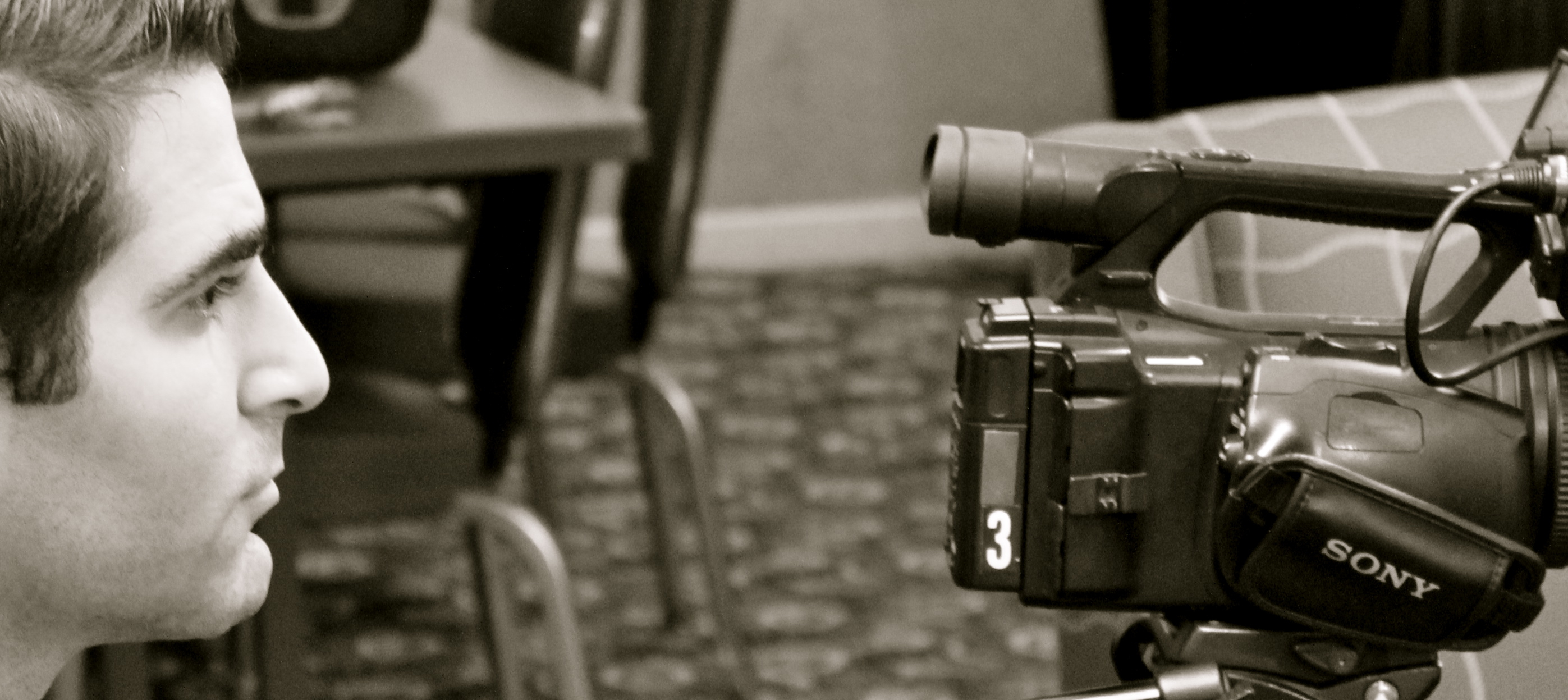

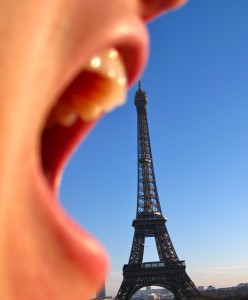
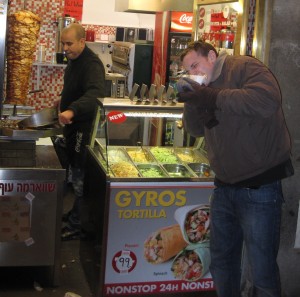
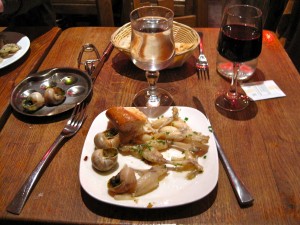
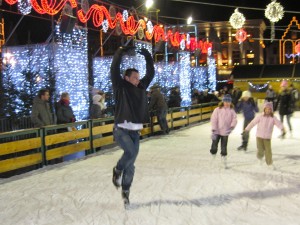
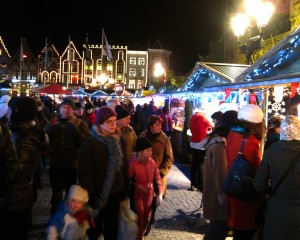
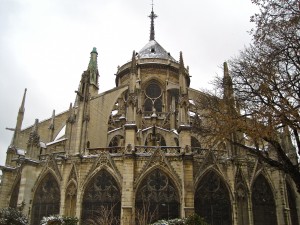
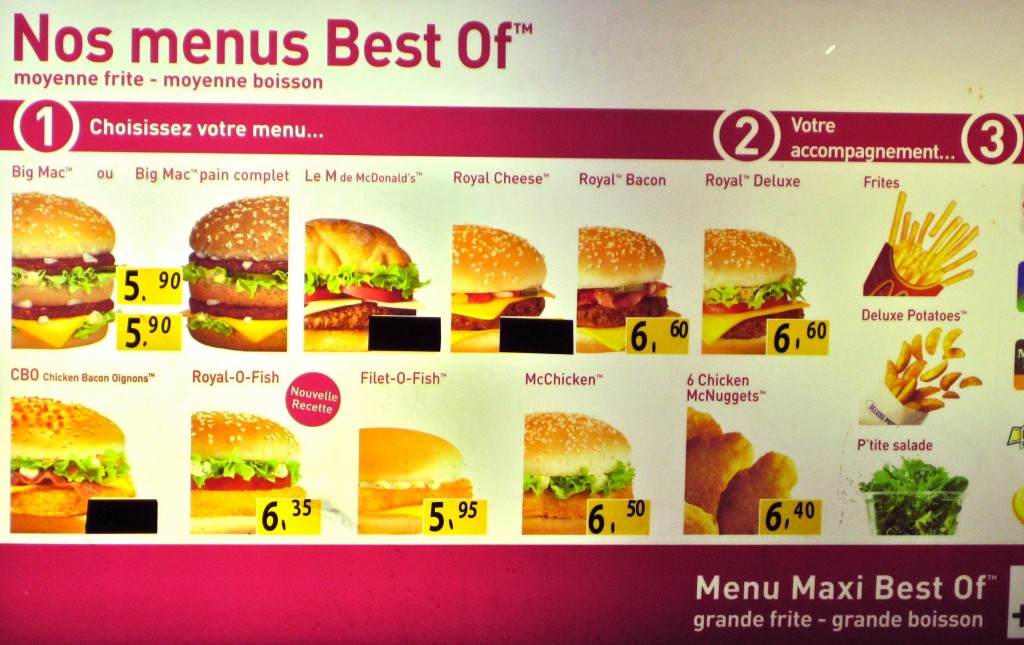
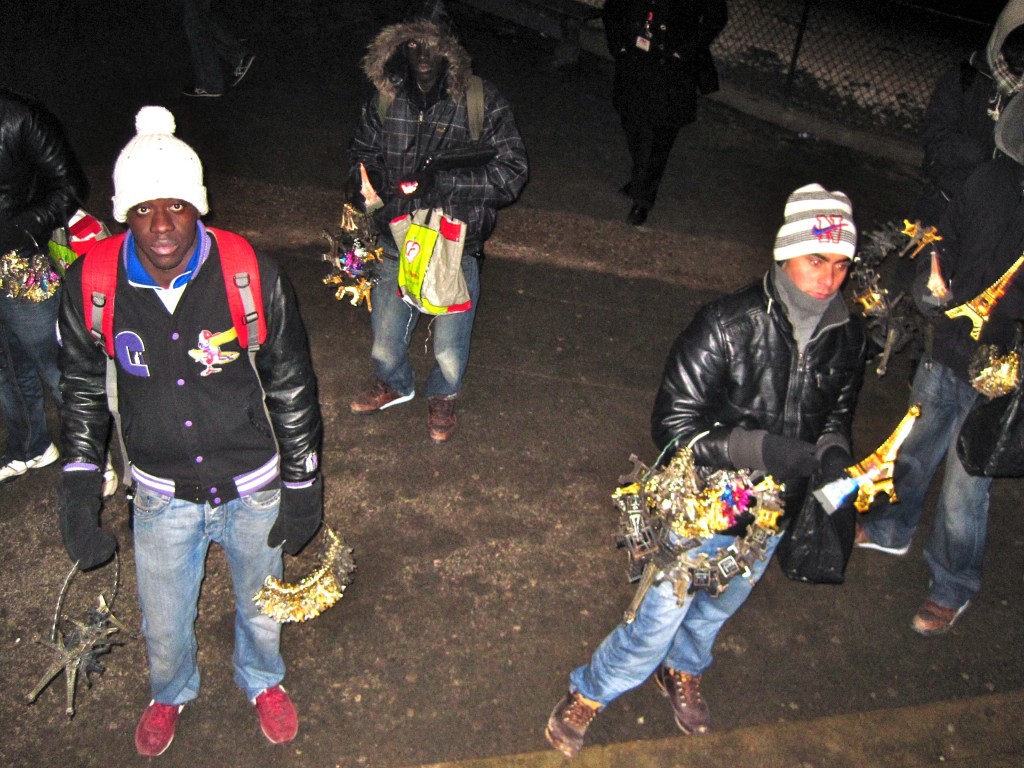
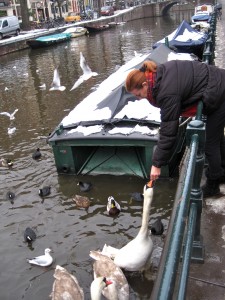
Loved this. We do love feeding the ducks- great observation. Really got my travel juices flowing. Must follow in Aunt Mar’s and now my son’s footsteps.